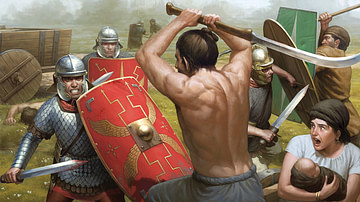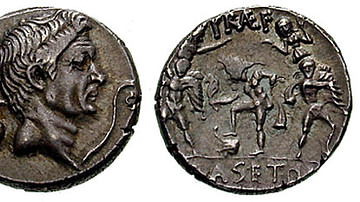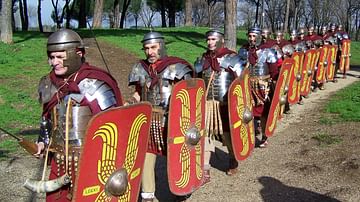Search
Did you mean: Arminius?
Search Results

Article
Visual Chronology of Roman Emperors: Augustus to Constantine
The Julio-Claudian Dynasty Augustus 16 Jan 27 BCE - 19 Aug 14 CE Tiberius 18 Sep 14 CE - 16 Mar 37 CE Caligula 18 Mar 37 CE - 24 Jan 41 CE Claudius 25 Jan 41 CE - 13 Oct 54 CE Nero 13 Oct 54 CE - 11 Jun 68 CE Galba 8 Jun 68 CE -...

Article
Legions of the Dacian Wars
The Dacian Wars started after Decebalus (r. c. 87-106 CE) raided the Roman province of Moesia in 85 CE. Emperor Domitian's (r. 81-96 CE) Dacian campaigns in 86-87 CE reached an uneasy peace, but the conflict was renewed under the reign of...

Article
The Battle of Pharsalus
Pharsalus, in eastern Greece, was the site of a decisive battle in 48 BCE between two of Rome's greatest ever generals: Pompey the Great and Julius Caesar. After several previous encounters, Pharsalus, the biggest ever battle between Romans...

Article
The Roman-Parthian War 58-63 CE
The Roman-Parthian War of 58-63 CE was sparked off when the Parthian Empire's ruler imposed his own brother as the new king of Armenia, considered by Rome to be a quasi-neutral buffer state between the two empires. When Parthia went a step...

Article
Legions of Judea
Judea was initially dependent on its neighbor Syria for military support until it received a Roman legion of its own in 70 CE after the Great Jewish Revolt of 66 CE. Legio X Fretensis was stationed at remains of the burned city of Jerusalem...

Article
Legions of Late Antiquity
The Roman army underwent dramatic changes in Late Antiquity. Civil war and external conflicts led to the creation of new legions while existing legions were either split or disbanded. Although there was an increase in the number of legions...

Article
Capitals of the Roman Empire: Constantinople & Rome
Constantinople at first had much in common with the temporary capitals of the 2nd and 3rd century CE and the tetrarchic capitals. It was an existing city of medium size, well located on the road network, and unlike most of them, it was also...

Article
Legions of Moesia
The province of Moesia was vital to the Roman military’s protection of the Balkans. Subdued by the Roman commander Marcus Licinius Crassus in 29 BCE, it was initially part of Macedonia. Due to its location along the Danube, it became essential...

Article
Psychological Intimidation at the Battle of Carrhae
Psychological intimidation in military conflict has been an art of war since ancient times. Employing misinformation, feigned movements, subtle messaging, and overt display of aggression, its employ is meant to unnerve the enemy before engagement...

Video
What Was Crassus Thinking? - The "Fool" of Carrhae
Today I wanted to take a closer look at the common narrative that Crassus was a bumbling idiot who caused the disaster of Carrhae. What was he thinking! Today we will attempt to reconstruct his chain of decisions to determine if they really...